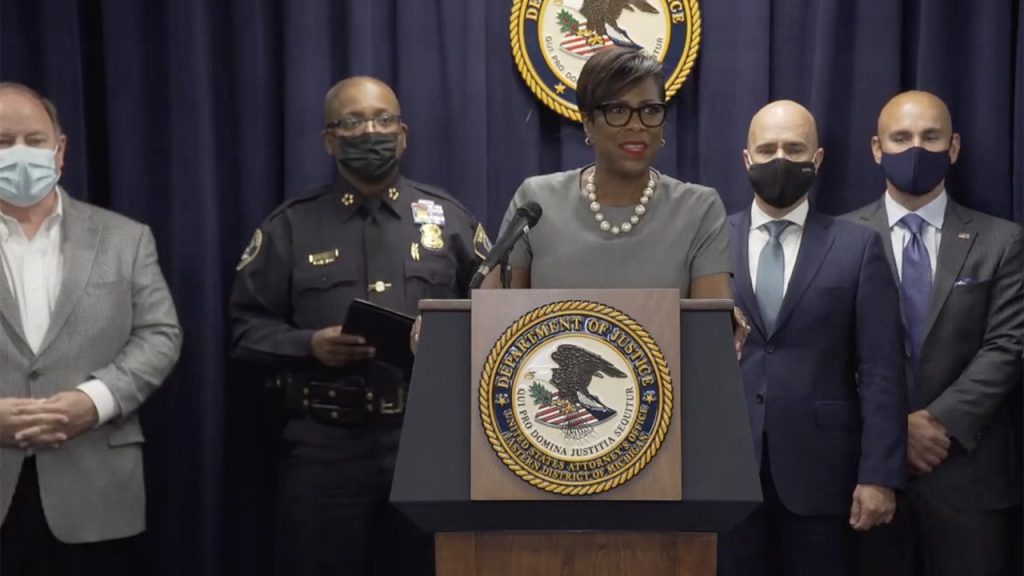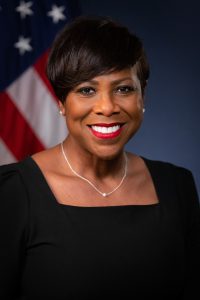FBI, ATF focus on gun violence in Detroit’s far east and far west sides this summer
U.S. Attorney Dawn Ison says Detroit’s 8th and 9th precincts are two of the most violent sections of Detroit, so authorities are taking a proactive approach to address gun violence.

Gun violence is a chronic problem in Detroit. And during warmer months, shootings are more frequent. In response, federal law enforcement is expanding its presence in the city this summer. The FBI and the Bureau of Alcohol, Tobacco, Firearms and Explosives are focusing on the far east and far west sides of Detroit, specifically around the 8th and 9th police precincts. The escalation comes at the direction of U.S. Attorney Dawn Ison, who was nominated by President Biden to head the Eastern District of Michigan last year and confirmed by the Senate in December.
“Everyone is outside. People are a little more free. People are imbibing alcoholic beverages. People are doing all sorts of things outside,” said Ison. “Across the nation, cities, especially large urban cities, see a spike in violent crime during these periods.”
According to the National Gun Archive, there have been more than 290 shooting incidents in Detroit this year. Recently, two teenagers were charged with shooting at Detroit police officers on patrol. This month, an 11-year-old girl was shot and killed during a sleepover in an area now targeted by the Department of Justice.
WDET’s Eli Newman spoke with U.S. Attorney Dawn Ison about the Justice Department’s response to gun violence in Detroit. Read an excerpt of their conversation, edited for brevity and clarity, below.
Newman: What happens during the summer in terms of the pattern of gun violence?

Ison: Everyone is outside. People are a little more free. People are imbibing alcoholic beverages. People are doing all sorts of things outside. Across the nation, cities, especially large urban cities, see a spike in violent crime during these periods. We’re just trying to get ahead of this. And we started this summer surge on Memorial Day and it will continue through Labor Day. And we are already in these precincts and in the city trying to address the most violent people, the most violent places and the most violent groups.
Can you tell me what exactly is going on in these precincts the Detroit Police Department’s 8th and 9th precincts – that is leading to this gun violence?
I think gun violence is up all across the nation and there are a number of reasons why. Some blame it on the COVID pandemic, the isolation. People are more irritable, people are more on edge. Just a number of variables and factors. But I think it is typically a higher-level of violent crime during the summers in all large cities. Historically, that always happens. But we’re just trying to get a tap on it and address it very proactively and we’re continuing this throughout the city and throughout this district, but particularly, these are two of the most violent sections of Detroit.
How much worse are those sections?
They have the highest homicides. They have the highest rates of violent crime. I don’t know any better than I can say than that. It’s all relative but if they are the most violent, then that means it’s a whole bunch, it’s a lot. But we are continuing like we did before the summer. And we will continue after to tamp down the violence in every corner of this district that we see it, going after the most violent offenders, the most violent places and the most violent groups. And we will do that in collaboration with all of our state and local partners.
Generally, do you see this effort to tamp down on gun violence as being your key priority as U.S. Attorney?
It’s one of three. It’s a very high one, though.
My first one is rebuild — rebuild community trust between law enforcement and the community. And that’s why I’m here being very transparent about what we’re doing with this summer surge, so that the community knows why we are there, our purpose for being there, and that we use the data. We’re not there to harass. We’re not there to do anything but get the most violent offenders out of these communities.
My next one is reinvigorate – that’s reinvigorate our prosecution and our litigation of civil rights and protecting civil rights. We’re doing that and we’re doing that work. We’ve been on in every county talking to every FBI resident office about our priorities and how we’re putting our efforts in that. My civil rights unit, the unit our public corruption and Civil Rights unit that covers our criminal Civil Rights unit, they are working more collaboratively and looking at these cases to see whether we can seek justice in one way or the other if it’s not very viable from a criminal perspective if we can maybe make a civil case out of it. We are pursuing hate crimes vigorously. We will bring those cases when we find hate crimes. And so we are doing that.
And then my last is restructure — and that is this restructuring our approach to violent crime. And that’s being focused, balanced and fair, including punishment and prevention. And as I mentioned, not only are we going to do enforcement, but we’re coming in there and we’re working toward peace picnics, and we’re coming in there in collaboration, hopefully with bringing resources in there. I have my other prosecutors in there looking at working with the community organizers in those communities so that we can identify the problems. Are there too many weeds? Is it a vacant house? Are the street lights on? So that we can communicate that to the people who can bring those resources or help to bring some relief in those areas as well.
It’s a very holistic approach. It’s punishment and prevention, but we’re trying to have focused deterrence and we’re trying to bring in resources and other things with the community and have engagement with the community in both an enforcement way and a non-enforcement way and that is part of my rebuilding and strengthening this community trust between law enforcement and the community.
Trusted, accurate, up-to-date.
WDET strives to make our journalism accessible to everyone. As a public media institution, we maintain our journalistic integrity through independent support from readers like you. If you value WDET as your source of news, music and conversation, please make a gift today.
